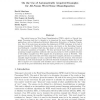10 search results - page 1 / 2 » Relieving the data Acquisition Bottleneck in Word Sense Disa... |
ACL
2004
13 years 6 months ago
2004
Supervised learning methods for WSD yield better performance than unsupervised methods. Yet the availability of clean training data for the former is still a severe challenge. In ...
COLING
2008
13 years 6 months ago
2008
Supervised approaches to Word Sense Disambiguation (WSD) have been shown to outperform other approaches but are hampered by reliance on labeled training examples (the data acquisi...
JAIR
2008
13 years 4 months ago
2008
This article focuses on Word Sense Disambiguation (WSD), which is a Natural Language Processing task that is thought to be important for many Language Technology applications, suc...
COLING
1992
13 years 5 months ago
1992
This paper describes a program that disambignates English word senses in unrestricted text using statistical models of the major Roget's Thesaurus categories. Roget's ca...
CICLING
2005
Springer
13 years 10 months ago
2005
Springer
The problem of the resolution of the lexical ambiguity, which is commonly referred as Word Sense Disambiguation (WSD), seems to be stuck because of the knowledge acquisition bottle...

